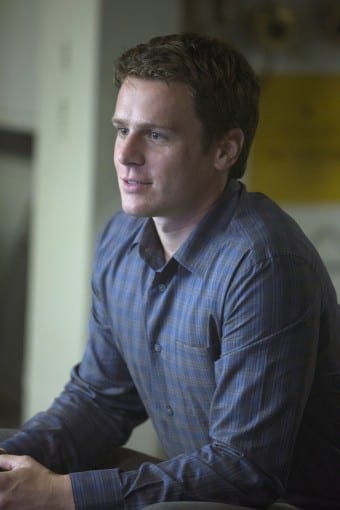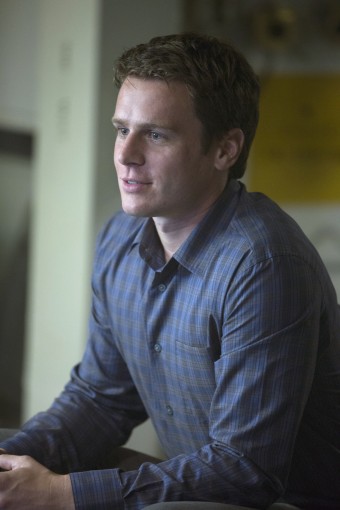
Jonathan Groff
Jonathan Groff has had a pretty good week. The animated film he stars in, Frozen, was just nominated for two Oscars and his new HBO series, Looking, debuts on Sunday. So it was a good time for our Chris Azzopardi to sit down with Groff to discuss all his gay projects, idolizing Mark Ruffalo and how Looking freaked out his family.
Jonathan Groff is remembering a scene he shot for the upcoming HBO adaptation of The Normal Heart. It’s his only part with Julia Roberts, and he doesn’t have a single line with her.
“She plays a doctor and I collapse on the street, and then they take me into her office and she’s like, ‘He’s dying,’” the actor recalls. “So I didn’t get to act with her because I’m, like, hyperventilating on a stretcher. I was foaming at the mouth. She was probably all, ‘This kid is really going for it.’ But she was really nice, very chill, very undramatic and easy.”
The same could be said for Groff. The affable Pennsylvania native got his start on stage, nabbing a Tony nomination for his role in the 2006 Broadway musical Spring Awakening before battling it out with New Directions on Glee, portraying a young David Sedaris in the recent feature film C.O.G. and voicing Kristoff in Disney’s hot winter hit Frozen. Now the actor plays Patrick, the charmingly clueless lead in the new gay-friends-living-in-San-Fran series Looking, which debuts Sunday on HBO. Will there be foam? Probably, but only if it’s at a party.
Dallas Voice: With Looking and The Normal Heart, it must be nice knowing that HBO is gonna pay your bills for at least the next year. Jonathan Groff: Right? It’s great. But I’ve already been paid for those jobs in 2013!
In the Looking pilot’s opening scene, after a phone call interrupts a hand-job hookup, you tell your friends you worried it was your mom calling. Has your own mother seen the show? My mom has always been really supportive of my work. When I was doing Spring Awakening she took bus trips of people to come and see the show — like, seriously, 40 people on a touring bus up from Pennsylvania. That was before she had even seen it, so she was shocked when she saw the sex and the nudity and me hitting Lea Michele with a stick, but she obviously enjoyed it … because there were three more bus trips after that! So she overcame the awkwardness of seeing my butt on stage, but ever since they cast me in Looking, the big question in my family has been: “Are they gonna watch it or not when it comes on TV?”
When I came home for the summer to Pennsylvania, I brought the pilot home on DVD and I just said, “I don’t know if you wanna watch this or not, but I feel like if you do watch it, you probably won’t wanna watch it with me in the room.” I think that really freaked them out.
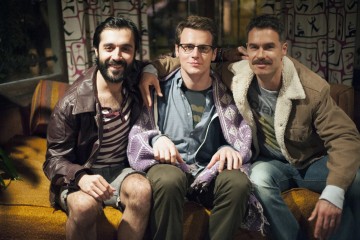 Director Andrew Haigh, who also did the 2011 gay indie drama Weekend, has a knack for capturing real moments on camera. How do you think he’s accomplished that in Looking? I could spend hours talking about Andrew Haigh. I saw Weekend and was like, “Wow, somehow he’s made a gay movie that feels universal.” I feel like whether [the characters] were gay or old or whatever, he could take any story and humanize it. He’s somehow able to catch really human moments.
Director Andrew Haigh, who also did the 2011 gay indie drama Weekend, has a knack for capturing real moments on camera. How do you think he’s accomplished that in Looking? I could spend hours talking about Andrew Haigh. I saw Weekend and was like, “Wow, somehow he’s made a gay movie that feels universal.” I feel like whether [the characters] were gay or old or whatever, he could take any story and humanize it. He’s somehow able to catch really human moments.
I would be done with work some days and Frankie [J. Alvarez], Murray [Bartett] and I would look at each other and say, “Did we even act today?” It felt so much like us hanging out that it didn’t feel like we were “acting.” It speaks to the energy of his movie Weekend, and also to the energy of our show. It was really unlike anything I’ve ever worked on before.
For Looking, what’s expected of you sexually and what are you not comfortable doing on the show? Seeing Weekend and knowing Andrew Haigh was attached to direct the show, I was like, “OK, I feel 100 percent comfortable to sign that nudity waiver and do absolutely anything.” I signed on before I really even knew him. I was like, “Yes, whatever, I’ll do anything.” Also, from years of being in Spring Awakening, I’ve built up a tolerance for acted intimacy. [Laughs] It doesn’t freak me out. And I don’t wanna give the story away, so I’m not gonna tell you the guy who I get naked with.
I hope it’s your boss. I know! He’s cute, right?
What do you have to say about the show being called a “gay version of Girls” — which, by the way, I don’t think is accurate. Your boobs don’t look anything like Lena Dunham’s. I love that! It’s about a group of friends in the way that Girls is about a group of friends, but the tone, writing and acting are totally different. I do think if you enjoy Girls you will enjoy Looking, because it’s about relationships and trying to find love and your place in the world.
When Queer as Folk aired in the early 2000s, the show reflected how anti-hair the gay community was. Body hair wasn’t as accepted in the gay community as it is now. And Looking and Weekend really represent the zeitgeist in that regard. How do you feel about Looking embracing a more bearish man? The more natural the body, the better. What they’re trying to do in Looking is show as many types of people and as many different types of bodies as possible, and also to stay true to San Francisco. And there’s a lot of facial hair and body hair in San Francisco!
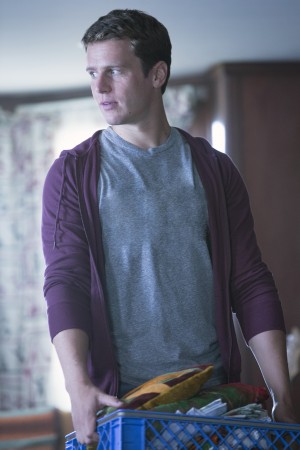 How much do you relate to Patrick and what’s going on in his life? At the first audition, because I knew Andrew’s work, I knew the lines but I didn’t do a lot of emotional preparation. I didn’t even say the lines out loud until I was in the room with him, because I wanted to find it in the moment. The first time I did the audition scene — the scene on the train where I meet Richie [Raul Castillo] — I started to get hot, but not in a sexy way. I got nervous-hot. I started sweating and blushing and I felt immediately, in the audition room, like, “I know who this guy is. I feel so connected to his social anxiety.”
How much do you relate to Patrick and what’s going on in his life? At the first audition, because I knew Andrew’s work, I knew the lines but I didn’t do a lot of emotional preparation. I didn’t even say the lines out loud until I was in the room with him, because I wanted to find it in the moment. The first time I did the audition scene — the scene on the train where I meet Richie [Raul Castillo] — I started to get hot, but not in a sexy way. I got nervous-hot. I started sweating and blushing and I felt immediately, in the audition room, like, “I know who this guy is. I feel so connected to his social anxiety.”
What shows and films did you connect with as a gay man who was figuring it all out? I remember being in eighth grade and seeing the billboards for Will & Grace — and then, there was so little gay anything. Not as much gay press, not as many out gay actors or gay material to watch, certainly not on network television. Any sort of shred of people being gay was like, “Oh my god, look at that. Is that me? Is that who I am?”
Even though I was not out in high school I knew that I was gay, and seeing that billboard and watching the show, even though I didn’t really feel like I was a Will or a Jack — I didn’t necessarily connect these characters to me — but just to see some gay characters on TV was great. It made me feel less alone.
As far as Looking is concerned, the story is very specific to Michael Lannan, our creator, and his group of friends. When they were auditioning for the show, they had pictures of his friends on the casting board to say, “This is what we’re looking for.” It’s very specific to his experience in San Francisco, but the gay community will hopefully still embrace the fact that there are gay people on TV in the way that I watched Will & Grace growing up.
Because of your role in Looking, how do you feel about possibly being the new poster boy for the gay community in the way Jack and Will were? I feel so excited to be a part of a show that could potentially be a great moment for the gay community, because it’s crazy how few shows there are where there are a lot of central gay characters. As an actor you sort of become the face of whatever you’re working on, and I feel really lucky to be a part of this specific show because I believe in it so much as a television show. I’m so proud to be a part of this show.
Maybe Patrick will inspire some kid to feel less alone. Yeah, totally. That would be amazing. I mean, that’s so cool. Yeah, that’s like beyond.
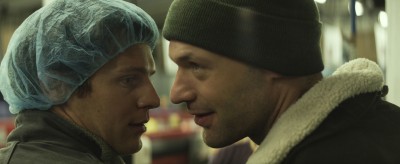
Jonathan Groff and Corey Stoll in ‘C.O.G.’
In addition to playing gay in Looking, you also played gay in C.O.G., an adaptation of David Sedaris short stories, and in The Normal Heart. Are you worried about being typecast? Or do you think that’s no longer a concern for actors playing gay roles? I don’t know. Only time will tell. For any actor, gay or straight, being typecast is the biggest thing you have to work against. When I did Spring Awakening in New York, it took a long time of auditioning and then I moved to L.A. to prove that I could do more than that. For any actor, you have to put in a lot of work to continually show people and the industry that you can do more. So if the show gets picked up season after season — which, god willing, I would love; that would be amazing and I would want nothing more than that — I’m also ready to take on the challenge of trying to bust out of a role if I get attached to something specific. Call me in 10 years, but I feel so excited to just continue to challenge myself.
Can we get Lea Michele on Looking? I mean, you did Glee, so I think it’s only fair. Oh my god, I would love that! I showed her the first episodes when we took a little trip to Mexico recently and she watched them all again a couple nights ago with her mom. She’s so excited. It would be so amazing to have her on.
Everyone’s always saying how charming you are. But what sets you off? What makes Jonathan Groff a living hell? Oh, good question. When we were doing Spring Awakening, I had to do this beating scene with Lea where I got really angry. In early days of rehearsals, Michael Mayer, our director, screamed at me, “Seriously, you’re like the most everything-happens-for-a-reason person I’ve ever met. What makes you angry?! I don’t get it.” And I said, “You, when you belittle people!” Which is what he was doing to me in that moment. He was thrilled to get a rise out of me and help me finally get there. But here’s what I hate: I hate when you’re at dinner with a couple who are dating or married and they belittle the other person in front of a group. It’s like nails on a chalkboard. I fucking hate that.
And you just dropped the F-bomb, so I know you really mean it. Yes! I hate that! I honestly hate that in any way, shape or form — with teachers, directors, producers, friends or anyone that is talking down to me or down to someone I’m with. It really pisses me off.
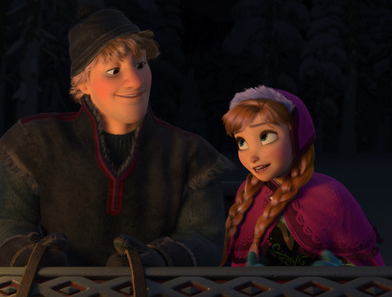 As a Disney fan, was the experience of voicing Kristoff in Frozen surreal for you? Yeah, I was Mary Poppins for Halloween, I was Peter Pan, and I grew up watching Disney movies.
As a Disney fan, was the experience of voicing Kristoff in Frozen surreal for you? Yeah, I was Mary Poppins for Halloween, I was Peter Pan, and I grew up watching Disney movies.
Do you see “Let It Go,” the film’s musical climax, being done by drag queens? Oh my god, completely. It’s like a gay anthem. I asked [composers] Bobby [Lopez] and Kristen [Anderson-Lopez], “Did you intend to write a gay anthem? Because I’m pretty sure you did.” They’re like, “No; honestly, when we wrote that song we were like, ‘We’re gonna go to a room right now and get really in an emotional place and write this ballad that is just true and honest and real.’” So they did not intend to write a gay ballad — but I think they did anyway!
You worked with Julia Roberts and Mark Ruffalo on Ryan Murphy’s adaptation of Larry Kramer’s 1985 play The Normal Heart, which airs in May. I mean, no big deal or anything. I know, it’s crazy. When The Kids Are All Right came out, I saw that movie three times in the movie theater and I’m so obsessed with it and I’m so obsessed with [Ruffalo] in it. Like a crazy person, I cut out a picture of him in a magazine — I’m not even kidding, I never do this — and put it on my dressing room mirror because I was like, “That’s who I wanna be.” I just admire him so much. And so in the movie I play his ex-boyfriend …
Do you get to kiss him then? We don’t have a kissing scene, which is unfortunate for me, because when the movie starts, we’re already exes. But just to be in the same room as him was a big deal for me. I fell deeper in love.
What do you hope the takeaway will be for this generation of LGBT people who didn’t experience the AIDS epidemic like those who saw The Normal Heart in its original form? We did this scene on the beach on Fire Island where they had a white party and there were extras in their early 20s — and I’m 28 — and we’re all having a blast, and then it hit a bunch of us as we were standing there that, in the story of this movie, most of these people are dead. Just standing there on the beach with everyone dressed in white being so young and having a great time — and thinking about what happened to the people who were dressed like this — it was really powerful and really affecting.
For my generation of people watching the movie, hopefully that will be like, “Oh, this was like us. This was us 30 years ago.” It’s so amazing that they’re turning that play into a movie, and that young people will watch. Maybe people who aren’t as connected to the AIDS crisis will be able to look back and see themselves in these characters and pass the story onto the next generation.
Looking premieres on HBO on Sunday at 9:30 p.m. Below is a clip from the first episode.

